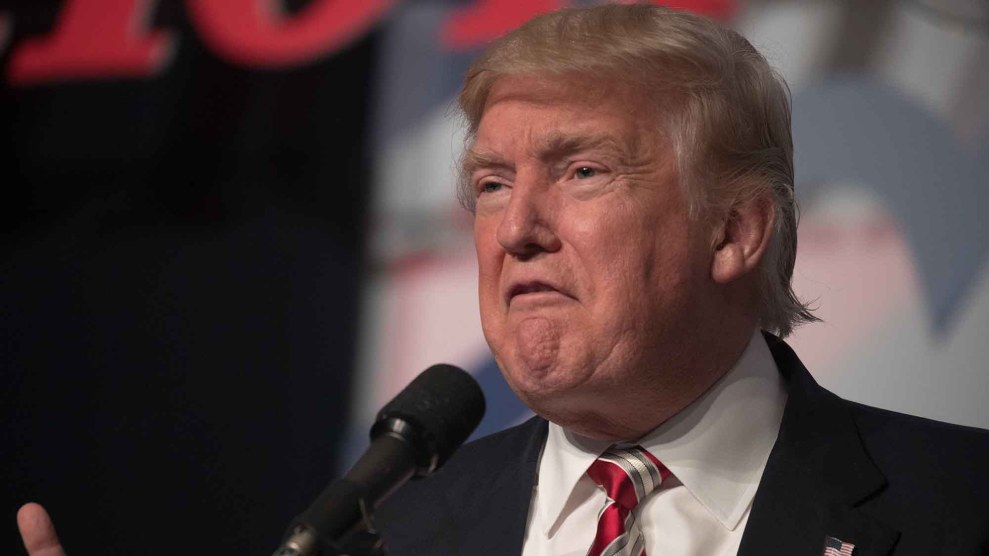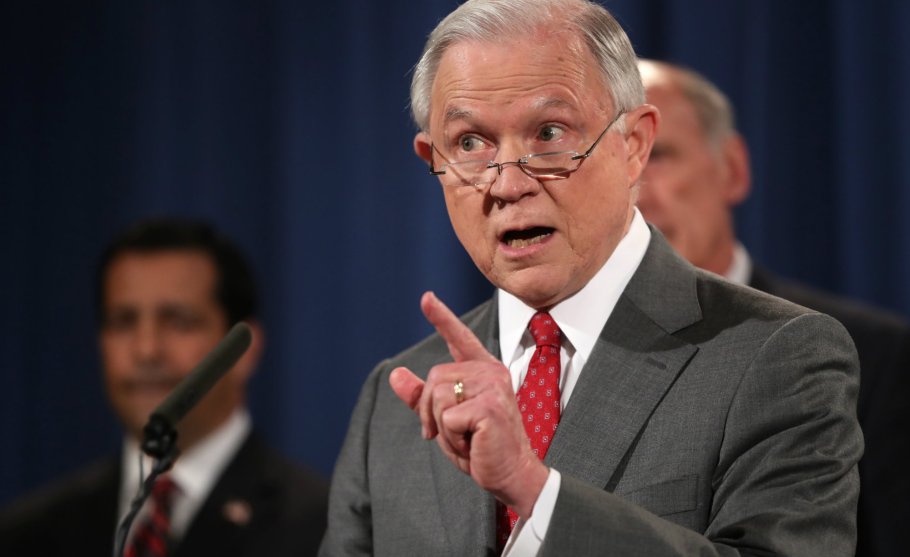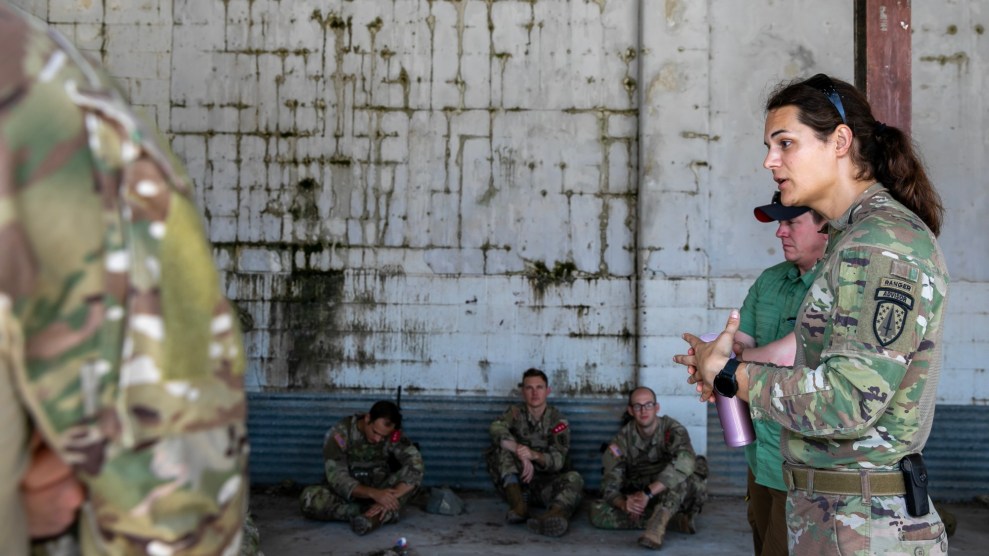
Jeff Malet/Zuma
Attorney General Jeff Sessions on Friday announced an aggressive plan to crack down on government leaks and said that the Department of Justice might try to stem the flow of leaks by subpoenaing the journalists who publish classified or sensitive information.
Donald Trump has spent the first half year of his presidency fuming on Twitter about the many leaks that have come out against his administration. The president has, in part, blamed his attorney general for the onslaught, saying that Sessions is taking “a VERY weak position…on INTEL leakers!”
Trump had a different view as a candidate last year, frequently praising WikiLeaks after the website published thousands of emails and other documents stolen from Hillary Clinton’s campaign chairman and the Democratic National Committee. Last July, Trump even encouraged the Russian government to hack Clinton’s emails from when she was secretary of state. “Russia, if you’re listening, I hope you’re able to find the 30,000 emails that are missing,” he said.
But since Trump became president, several major leaks have revealed things that, if true, cast the president and his associates in an extremely negative light at best, and could offer evidence of serious crimes at worst. Here are just a few of the major stories that the public only knows about thanks to leaks from anonymous government sources. Not all of these examples are necessarily crimes that Sessions could prosecute—some of the information divulged may not have been classified—but all likely helped provoke the administration’s war on leaks.
Former National Security Adviser Mike Flynn lied about his contacts with the then-Russian ambassador. On February 9, the Washington Post reported that US intelligence intercepts showed that, despite denials to his colleagues, Flynn had spoken during the transition period to Sergey Kislyak, Russia’s ambassador at the time, about US sanctions on Russia. Flynn had previously told Vice President Mike Pence that there had been no discussion of sanctions, and Pence repeated the claim in nationally televised interviews.
Intelligence and Justice Department officials knew that Flynn had lied, and they warned the White House that Flynn’s lie could be used by the Russian government as blackmail—meaning that Trump’s National Security Adviser was, himself, an apparent national security risk. Flynn stayed on the job for another 18 days before Trump fired him. Trump said he fired Flynn not for the contact with Kislyak, but for lying to Pence about it. Flynn might still be working in the White House if the Washington Post hadn’t received that leaked information.
Trump asked former FBI Director James Comey to drop the investigation into Flynn. On May 16, the New York Times reported that in February, after a meeting with several top national security officials, Trump asked Comey to stick behind in the Oval Office. When they were alone, the president allegedly told Comey that he hoped he “could see [his] way clear to letting this go, to letting Flynn go.”
Comey documented the encounter in a contemporaneous memo that was later read to the Times, and Comey then talked about the request in June during testimony before the Senate Intelligence Committee. Those memos were the subject of another New York Times story, this one alleging that Trump had asked Comey for “loyalty.” The White House denied Comey’s characterization of the request.
Two days after the Times revealed the existence of the memos, Deputy Attorney General Rod Rosenstein appointed a special counsel to investigate the Trump campaign’s possible collusion with the Russian government.
Trump called Comey “crazy” and “a nut job” in a meeting with top Russian officials and said that firing Comey relieved pressure from the Russia investigation. The day after Trump fired Comey, he met with Russian Foreign Minister Sergey Lavrov and Kislyak at the White House. During the meeting, Trump reportedly told the Russians, “I just fired the head of the F.B.I. He was crazy, a real nut job…I faced great pressure because of Russia. That’s taken off.”
The official White House account didn’t include this exchange, but on May 19 the New York Times published the comments thanks to an “American official” who read notes of the meeting to a Times reporter. Then-White House Press Secretary Sean Spicer did not dispute the account when asked by the Times for a response.
Jared Kushner reportedly sought to establish a secret line of communication with the Russian government during the transition using Russian-government equipment. On May 26, the Washington Post reported that Kushner, Trump’s son-in-law and one of his key White House advisors, discussed with the Russian ambassador the possibility of “setting up a secret and secure communications channel” between the Trump team and the Russian government, “using Russian diplomatic facilities in an apparent move to shield their pre-inauguration discussions from monitoring, according to US officials briefed on the intelligence reports.” Kushner later denied the Post’s characterization of his meeting, saying instead that he merely sought to engage the Russians on how to solve problems in Syria.
Donald Trump Jr., hoping to get dirt on Clinton, arranged a meeting with a Russian lawyer. Then President Trump helped craft a misleading description of his son’s meeting. On July 8, the New York Times, using “confidential government records,” reported that Donald Trump Jr. arranged a meeting with a Russian lawyer, Kushner, former Trump Campaign Chairman Paul Manafort, and several other people. The next day, the Times reported that the meeting was arranged via email with an explicit promise from a Russian associate of the Trump family that dirt on Hillary Clinton originating from the Russian government would be offered.
Under pressure, Trump Jr. released the email chain to the public—confirming the story—and said the meeting was minor and no big deal. Jay Sekulow, one of the president’s lawyers, denied that the president had anything to do with crafting the response. But then on July 31, the Washington Post, using anonymous sources, reported that the president was involved in crafting White House’s response to the original story—a response that misleadingly claimed that the meeting was about the Magnitsky Act, a 2012 law that sanctioned Russian officials thought to be involved in killing a Russian lawyer. White House Press Secretary Sarah Huckabee Sanders then acknowledged that the president was involved, proving that the president’s lawyer misled the public about the president’s role in the matter.
Sessions, too, was the subject of leaks. On July 21, citing “current and former US officials,” the Washington Post reported that Sessions had discussed campaign-related matters with the Russian ambassador last year, contrary to what Sessions had said after it was revealed in March that he had met with Russian officials. The day after those revelations came out in March, Sessions recused himself from all Russia-related matters. Trump has since said that he regrets choosing Sessions as his AG and that he would have picked someone else if he had known that Sessions would recuse himself from the Russia investigation. The president hasn’t fired Sessions yet, but the attorney general has extra incentive to crackdown on leaks after unauthorized disclosures put his job in jeopardy.
















